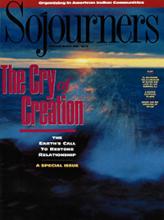Several months before he was killed along with five other Jesuits and two women on November 16, 1989, Father Ignacio Martin-Baro said in a video-taped interview that he considered the U.S. solidarity movement responsible in large part for the fact that he and his Jesuit colleagues in El Salvador were still alive.
In that lies the encouragement and the challenge for us.
In tragic irony, the Jesuits at the university in San Salvador -- representing a voice of reason and dialogue -- had their brains ripped apart by high-caliber automatic gun-fire. Their Oscar Romero Center for Theological Reflection was the target of a sustained military attack lasting more than 30 minutes, as neighbors attested.
It is inconceivable that the U.S.-sponsored Salvadoran military, which had the campus completely surrounded and secured, could have been unaware of the entry of a large, well-armed group of uniformed men and oblivious to the barrage of gunfire.
The Jesuits were massacred because they took seriously the Latin American church's option for the poor and the Jesuits' official mission to serve faith and promote justice. They also risked death by calling for a negotiated political solution of the conflict.
The Far Right, eager to obliterate not only the FMLN (Farabundo Marti National Liberation Front) but the entire civic and political opposition, felt that the Jesuits, especially Father Ignacio Ellacuria, president of the university, might be able to move the government toward negotiations. Thus they acted on the old slogan of the 1970s: "Be a patriot, kill a priest. "
Read the Full Article
